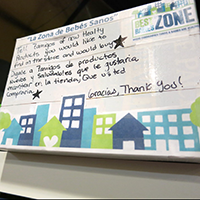Best Babies Zone
“Best Babies Zone” is part two of a two-part series on life course theory. To read part one, click here.
Over the last two centuries, the improvement of medicine, nutrition, and childcare resources has drastically reduced the infant mortality rate in the United States. Due to this major decline, birth outcomes, or the health of a baby at birth, have taken a backseat, in many ways, to other issues affecting the health of a community. While there is a positive trend in reducing infant mortality overall, a CDC study done in 2013 shows that a child born to an African American mother is twice as likely to die as a child born to a Caucasian mother. Racial disparity such as this indicates serious problems facing communities nationwide. Fortunately, UC Berkeley’s School of Public health is partnered with a revolutionary organization working to address this issue.
The Best Babies Zone is a community health organization with the objective of improving birth outcomes within communities suffering from racial and economic disparities in maternal and child health. This organization can be set apart from most any other, for it operates on a fundamentally different approach employing the ideas of life course theory.
As defined by Cheri Pies, the principle investigator at Best Babies Zone, “The life course perspective is a way of looking at life, not as disconnected stages, but as an integrated continuum.” A life course approach to health issues addresses the wide spectrum of components that contribute to the health of an individual and in turn a community. This differs from the traditional health care approach that attempts to treat specific health problems that have arisen in a population. Instead, Best Babies Zone wants to “cultivate a public health social movement within each city to rally community action aimed at improving the social determinants of health, birth outcomes, and ultimately the quality of life overall in the zone,” Pies said in a lecture given to at the University of Alabama. Just as modern medicine has exhibited a trend toward preventative care as opposed to treatment, the future of public health lies in the application of life course theory.
The Best Babies Zone utilizes life course theory to empower community members and organizations across the nation through programs and events that focus on enriching four major facets of the community: economic development, education and early childhood, health services, and community systems. The closest Best Babies Zone is the community of Castlemont, a neighborhood located in Oakland. Pies, speaking on the issues facing Castlemont, said, “There is a 13 year difference in life expectancy between a child born in the Oakland Hills and a child born in Castlemont.” This demonstrates a health disparity propagated by economic inequality. The Best Babies Zone, in cooperation with local public health organizations such as Youth UpRising and Brighter Beginnings, has implemented a number of programs, such as a monthly community market, which enriches the local economy and promotes the work of local entrepreneurs who are geared towards addressing this disparity from a multitude of perspectives. Further activities include accessible home visits by a nurse for new babies, and parenting support in the form of educational opportunities.
The results of the work being done in Castlemont, as well as the other selected zones, have been positive and encouraging not only for the continuation of the program but for its expansion. Just this year, the W.K. Kellogg Foundation has decided to provide a grant of $1.4 million, specifically for expanding the reach and impact of the Best Babies Zone strategies to even more communities in need.

